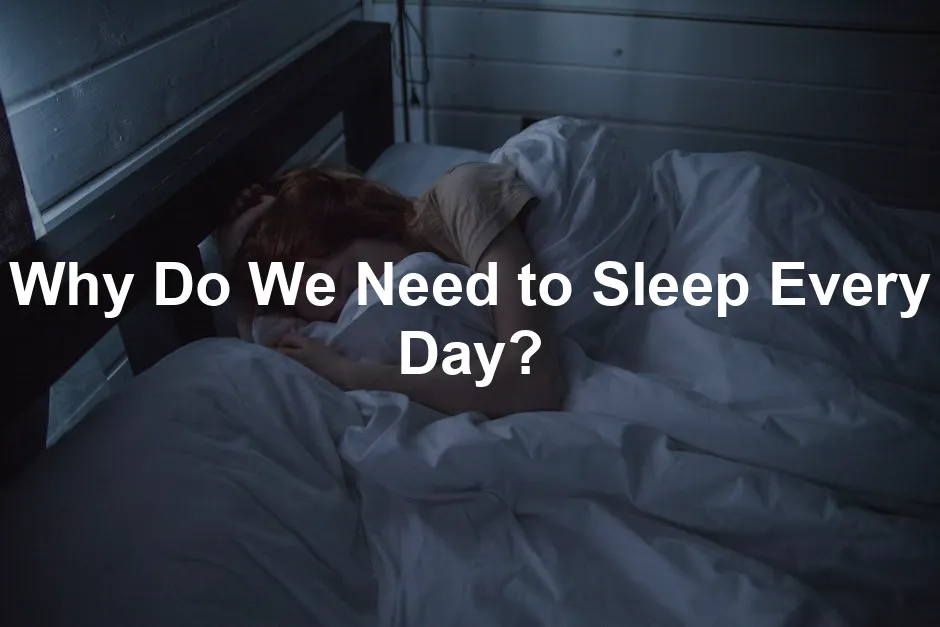
Why Do We Need to Sleep Every Day?
Introduction
Sleep is like a superhero for our health and well-being. It swoops in each night, recharging our bodies and minds. Yet, one in three American adults doesn’t get enough sleep. Yes, you heard that right! That’s a staggering number of people running on empty. When we skimp on sleep, we risk our health, mood, and even our ability to think clearly.
This article aims to uncover the vital reasons we need sleep daily. From physical recovery to mental clarity, sleep is essential for our physical, mental, and emotional health. So, grab your favorite pillow—let’s dive into why sleep is the ultimate power-up for life!

The Science Behind Sleep
Understanding Sleep
Sleep isn’t just a period of inactivity; it’s a complex process with distinct stages. There are two main types: Non-Rapid Eye Movement (NREM) and Rapid Eye Movement (REM) sleep. NREM sleep includes three stages, starting from light sleep and progressing to deep sleep, which is crucial for recovery. REM sleep, on the other hand, is when most dreaming occurs and is essential for memory consolidation.
During sleep, our bodies perform vital biological processes. Cells conserve energy, and the brain engages in maintenance tasks. This includes organizing memories and clearing out toxins. So, while you think you’re just catching Z’s, your body is busy working hard!

Circadian Rhythms
Now, let’s talk about circadian rhythms. These internal clocks regulate our sleep-wake cycles based on environmental cues. They help us feel awake during daylight and sleepy when the sun goes down. Light exposure plays a significant role here, as bright light can delay the release of melatonin, the sleep hormone.
When we mess with our natural rhythms, say by binge-watching shows late at night, we disrupt our sleep patterns. This can lead to poor sleep quality and a host of health issues. So, understanding and respecting these rhythms is key to getting that much-needed rest!
Why Sleep is Essential for Health
Physical Health Benefits
Immune Function
Sleep is the body’s secret weapon against illness. During slumber, the immune system ramps up its efforts. It produces proteins called cytokines that fight infection and inflammation. This is crucial when your body is under stress or battling a virus. Studies reveal that sleep deprivation can significantly weaken your immune response. For example, individuals who skimp on sleep are more susceptible to colds and other infections. A notable study found that people getting less than seven hours of sleep were nearly three times as likely to catch a cold compared to those who slept for eight hours or more. So, if you want to dodge the next bug, make sleep your first line of defense!
To enhance your immune health even more, consider using a Sleep Mask. It helps block out distractions and light, allowing you to achieve that deep restorative sleep your body craves!
Growth and Repair
When you think of sleep, think of a nightly repair crew. Your body works hard during sleep to recover and rebuild. Growth hormone, which plays a vital role in tissue growth and muscle repair, is released primarily during deep sleep. After an intense workout, your muscles are sore and need time to recover. Guess what? Sleep is when that recovery happens. Research indicates that athletes who prioritize sleep experience better muscle recovery and performance. Inadequate sleep, on the other hand, can lead to slower recovery times and decreased athletic performance. So, if you plan to hit the gym hard, don’t forget to hit the hay too!

To assist with that recovery, consider investing in a Memory Foam Pillow. It provides essential support for your neck and spine during those precious hours of sleep!
Mental Health Benefits
Cognitive Function
Sleep is like a filing system for your brain. It helps consolidate memories and enhances learning. When you doze off, your brain processes the information gathered throughout the day. It organizes and stores memories, making it easier to retrieve them later. A lack of adequate sleep disrupts this process. Research shows that sleep deprivation can lead to impaired focus, slower reaction times, and poor decision-making. For instance, one study found that individuals who missed just one night of sleep performed as poorly on tasks as those who were legally intoxicated. So, if you want to ace that big test or nail a presentation, make sure your brain is well-rested!

To keep your mind sharp, consider using a White Noise Machine. It can create a soothing background sound to help drown out distractions and improve your sleep quality!
Emotional Regulation
Ever noticed how a bad night’s sleep can make you feel cranky? Sleep plays a crucial role in emotional regulation. It helps manage stress and mood swings. Insufficient sleep can lead to heightened emotional reactivity and increased feelings of anxiety and depression. Studies show that people with sleep disorders are more likely to experience mental health issues. A well-rested brain is better equipped to handle stress and maintain a balanced mood. So, if life feels overwhelming, consider prioritizing your sleep. A good night’s rest might just be the remedy you need!

Additionally, you might want to try an Aromatherapy Sleep Spray to create a calming atmosphere before bedtime!
In conclusion, sleep is not just a luxury; it’s a necessity for both physical and mental health. From boosting your immune system to enhancing cognitive function, embracing a regular sleep routine can transform your well-being. So, tuck yourself in and let your body do its magic!
Understanding the importance of sleep is crucial for maintaining overall health. You can learn more about why sleep is important for health.

Consequences of Sleep Deprivation
Short-Term Effects
Lack of sleep creates an immediate whirlwind of chaos. Ever tried to function like a normal human after a sleepless night? Spoiler alert: it’s not pretty! Cognitive functions take a nosedive, making it hard to concentrate. In fact, studies show that after just one night of poor sleep, your focus can plummet by up to 30%. That’s not just a little dip; that’s a screaming plunge!
Irritability becomes your new best friend. You may find yourself snapping at loved ones over trivial matters. Fatigue wraps around you like an unyielding blanket, making even the simplest tasks feel Herculean. Research suggests that sleep deprivation can increase irritability and mood swings by up to 40%. And let’s not forget about the dreaded “sleep hangover”—that foggy, lethargic feeling that sticks around long after your alarm clock goes off.

One study found that sleep-deprived individuals performed worse on tasks requiring quick thinking than those with adequate rest. It’s akin to driving while under the influence, where your reaction time and judgment are severely impaired. So, the next time you think about pulling an all-nighter, remember how much you might be sacrificing for those extra hours of binge-watching!
Long-Term Effects
Chronic sleep deprivation is like a sneaky villain, creeping in to wreak havoc on your health. It raises your risk of obesity, diabetes, and heart disease. Yes, you read that right! Research indicates that people who consistently sleep less than seven hours a night are at a significantly higher risk for developing type 2 diabetes. Hormonal changes brought on by lack of sleep can lead to increased hunger and cravings. Talk about a recipe for disaster!

Cardiovascular issues are also a big concern. Studies show that individuals who skimp on sleep have a 61% greater risk of heart disease. Over time, the body’s stress response can become dysregulated, leading to elevated blood pressure. Regularly missing out on sleep can also lead to chronic inflammation, which is a precursor to many serious health conditions.
And let’s not overlook mental health. The connection between sleep and mental disorders is well-documented. Chronic sleep deprivation can significantly increase the risk of anxiety and depression. Insufficient sleep can affect brain function, leading to mood swings and emotional instability. A well-rested brain is essential for managing stress and maintaining a balanced mood.
In essence, skimping on sleep isn’t just about feeling tired. It’s about safeguarding your long-term health and well-being. Prioritize sleep, and your body will thank you in the long run!

How Much Sleep Do We Need?
Sleep is much more than a nightly ritual. It’s a biological necessity. The amount of sleep you need can vary based on age, lifestyle, and individual health. But how much sleep is enough for you? Let’s break it down!
Recommended Sleep Durations by Age
Understanding how much sleep is ideal for different age groups can help you prioritize your rest. Below is a handy table that outlines the recommended sleep durations:
| Age Group | Age Range | Recommended Amount of Sleep per Day |
|---|---|---|
| Newborns | 0-3 months | 14-17 hours |
| Infants | 4-11 months | 12-15 hours |
| Toddlers | 1-2 years | 11-14 hours |
| Preschoolers | 3-5 years | 10-13 hours |
| School-age | 6-12 years | 9-12 hours |
| Teenagers | 13-18 years | 8-10 hours |
| Adults | 18 years and older | 7-9 hours |
| Older Adults | 65+ years | 7-8 hours |

This table highlights the importance of adjusting sleep needs as we age. Newborns, for instance, can sleep up to 17 hours, while older adults might need slightly less.
Individual Variability
Now, let’s address the elephant in the room—individual variability. Not everyone fits neatly into a sleep duration box. Factors like genetics, lifestyle, and health conditions can significantly influence how much sleep you need.
Genetics play a major role. Some people are natural short sleepers, functioning well on less than six hours. Others need closer to ten hours to feel their best. This is not just a personal preference; it’s wired into your DNA!
Lifestyle choices also come into play. If you’re a night owl who works late shifts, you may find your sleep needs differ significantly from someone who rises with the sun. Stress levels and physical activity can also impact how much shuteye you require.
Health conditions can’t be ignored either. Those with chronic illnesses or sleep disorders may need more sleep to feel rested. For example, individuals with conditions like sleep apnea may wake multiple times during the night, affecting their overall sleep quality.

In short, while age-based recommendations provide a great starting point, listening to your body is essential. If you’re feeling groggy or unfocused, it might be time to reassess your sleep habits!
Tips for Improving Sleep Quality
Let’s dive into some tips that can help you improve your sleep quality. After all, it’s not just about the hours you log in bed, but the quality of that sleep, too!
Sleep Hygiene Practices
Creating the right sleep environment is crucial. Here are some actionable tips to get you started:
- Keep It Dark: Darkness signals your body to produce melatonin. Use blackout curtains or an eye mask to block out light.
- Cool It Down: A cooler room can help you fall asleep faster. Aim for a temperature between 60°F to 67°F.
- Quiet Please: Minimize noise disruptions. Consider earplugs or a white noise machine to drown out sounds.
- Consistent Sleep Schedule: Going to bed and waking up at the same time daily helps regulate your body’s internal clock.
- Bedtime Routine: Wind down with relaxing activities like reading or gentle stretching. Avoid screens an hour before bed to decrease blue light exposure.

Incorporating these practices into your nightly routine can significantly enhance your sleep quality, making those hours spent in slumber truly restorative.
By prioritizing sleep and refining your habits, you can improve your sleep quality and wake up feeling refreshed and ready to tackle the day!
Lifestyle Changes
To achieve better sleep, small lifestyle tweaks can work wonders. First on the list? Caffeine management. We all love that morning cup of joe, but consuming caffeine too late can keep you tossing and turning. Aim to limit caffeine intake to early in the day. Trust me, your future self will thank you for skipping that afternoon espresso!
Next, let’s talk about screens. Yes, those glowing devices are not your buddies when it comes to bedtime. Blue light emitted by phones, tablets, and TVs tricks your brain into thinking it’s still daytime. Try to power down at least an hour before bed. Instead, pick up a book or listen to soothing music to wind down. Your eyes (and mind) will love you for it!
Physical activity is another secret weapon for better sleep. Regular exercise not only keeps you fit but also promotes deeper sleep. Aim for at least 30 minutes of moderate exercise most days. Just remember, hitting the gym too close to bedtime might have the opposite effect, so schedule those workouts wisely.
Finally, consider your sleep environment. A cool, dark, and quiet bedroom can create a perfect sleep oasis. Invest in blackout curtains, earplugs, or a white noise machine if needed. Creating a relaxing atmosphere can signal your body that it’s time to snooze. Prioritize these changes, and watch your sleep quality improve!
FAQs
What are the consequences of not sleeping enough?
Not getting enough shut-eye can lead to a slew of consequences, both short-term and long-term. In the short term, you might experience irritability, fatigue, and difficulty concentrating. Studies reveal that sleep-deprived individuals can perform at levels equivalent to being legally intoxicated! Long-term consequences are even more daunting. Chronic sleep deprivation can increase the risk of serious health issues like obesity, diabetes, cardiovascular diseases, and even mental health disorders. Your immune system takes a hit, making you more susceptible to illnesses. In essence, skimping on sleep is a recipe for disaster!
Can you “catch up” on sleep over the weekend?
Ah, the age-old question of whether weekend sleep can save the day! Technically, you can “catch up” on sleep, but it’s not as magical as it sounds. Sleep debt accumulates when you miss out on necessary hours during the week. While sleeping in on weekends can help, it often doesn’t fully make up for lost sleep. Research shows that while a few extra hours can alleviate some fatigue, it doesn’t restore all cognitive functions or health benefits. Instead, strive for consistency throughout the week. This way, you can avoid accumulating sleep debt in the first place.
What are common sleep disorders?
Sleep disorders are more common than you might think. Some of the usual suspects include: Insomnia: The struggle to fall asleep or stay asleep, often leading to daytime fatigue. Sleep Apnea: A serious condition where breathing repeatedly stops and starts during sleep, causing disrupted rest. Restless Leg Syndrome: An uncontrollable urge to move the legs, often accompanied by uncomfortable sensations, making it tough to relax. Narcolepsy: A neurological disorder characterized by excessive daytime sleepiness and sudden sleep attacks. If you suspect you have a sleep disorder, consulting a healthcare provider is crucial for proper diagnosis and treatment.
How can I tell if I have a sleep disorder?
Identifying a sleep disorder can be tricky, but there are clear signs to watch for. If you frequently struggle to fall or stay asleep, feel tired despite ample hours of sleep, or experience daytime sleepiness that affects daily activities, it’s time to pay attention. Other indicators include loud snoring, gasping for air during sleep, or experiencing tingling sensations in your limbs at night. If any of these symptoms resonate with you, don’t hesitate to consult a healthcare professional for advice and potential evaluations. Sleep is too important to take lightly!
Please let us know what you think about our content by leaving a comment down below!
Thank you for reading till here 🙂
All images from Pexels




